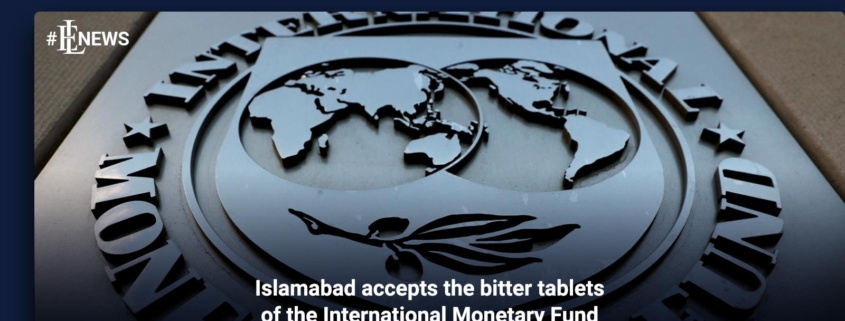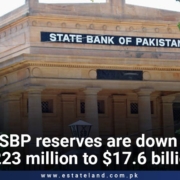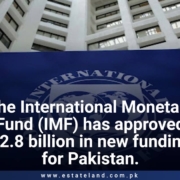Islamabad accepts the bitter tablets of the International Monetary Fund
Islamabad accepts the bitter tablets of the International Monetary Fund. Pakistan has agreed to accept Rs800 billion in measures, including spending cuts and a Rs500 billion tax increase, including a Rs20 per litre gasoline tax, in order to restart the stalled $6 billion International Monetary Fund (IMF) program.
“The Federal Board of Revenue’s (FBR) tax collection target has been boosted to Rs6.1 trillion – an increase of approximately Rs300 billion – and the government will also need to obtain parliament to adopt the State Bank of Pakistan modification bill,” Finance Adviser Shaukat Tarin said on Monday.
While Tarin revealed what the government will have to accomplish in less than two months, he did not conceal details of what seemed like highly stringent International Monetary Fund terms that, if executed in full, would not only consume enormous political capital but would also trigger another wave of inflation.
“Price stability, the rupee’s exchange rate, and the level of interest rates will be the responsibility of the central bank, with no role for the government,” Tarin told reporters while outlining the terms of the SBP autonomy agreement with the International Monetary Fund.
“There will also be another increase in power tariffs in the coming months; the increase is now estimated to be around 50 paisa per unit, but the precise amount will depend on the level of circular debt,” Energy Minister Hammad Azhar stated during a news conference.
The government has already increased the base tariff by Rs3.63 per unit in two instalments since February.
Tarin and Hammad addressed the media hours after the International Monetary Fund announced the conditions under which Pakistan will be approved for the $1 billion loan tranche. Tarin stated that after all conditions were completed, the IMF’s board of directors will convene in January to approve the economy’s sixth assessment.
“The Pakistani authorities and International Monetary Fund staff have reached a consensus at the staff level on the policies and reforms necessary to conclude the sixth review under the EFF,” the IMF announced Monday morning from Washington.
According to the IMF statement, Pakistan was still only halfway to getting the $1 billion loan, as approval by the IMF’s Executive Board had been legally connected to the fulfilment of the pre-conditions.
“Prior to the International Monetary Fund board meeting, the supplementary finance bill will be introduced in the National Assembly, the petroleum development levy will be increased by Rs4 per month until it reaches the maximum rate of Rs30, the SBP Amendment Bill will be approved, the Covid-19 expenditures will be audited, and information about beneficial ownership of coronavirus vaccines will be shared,” Tarin explained.
Previously, in contravention of the International Monetary Fund agreement, the government decided to keep the Coivd-19 spending audit report confidential. Tarin conceded that as a result of the IMF criteria, “difficulties for lower-income people will grow marginally, but targeted subsidies will be provided.”
Tarin indicated that around Rs350 billion in GST exemptions will be phased out, the Public Sector Development Program would be slashed by Rs200 billion or 22%, and “contingency assistance” would also be cut by Rs50 billion.
According to Finance Ministry sources, “the contingency grants are primarily intended to cover the military’s hardware requirements.”
Tarin stated that the new objective for petroleum development was Rs356 billion – down from the Rs610 billion outlined in the budget. Only two weeks ago, the government increased the per-litre petroleum charge to over Rs10, from about Rs6.
Pakistan would have to maintain a primary budget surplus after debt payment costs, compared to the budget aim of Rs376 billion deficit, implying stringent fiscal discipline with severe economic consequences.
According to a finance ministry official, the net increase of Rs20 per litre in the petroleum duty will yield approximately Rs275 billion in the remaining fiscal year.
The cumulative fiscal impact of previous steps is around Rs800 billion, including a Rs250 billion reduction in spending and a Rs550 billion increase in taxation throughout the remainder of the fiscal year. The Rs800 billion is equivalent to 1.5 percent of gross domestic product (GDP), making it one of the most significant modifications during the recovery process.
In response to whether the IMF’s board of directors will approve Pakistan’s loan request on January 12, Tarin stated that the executive board’s approval would most likely occur in January 2022. Previously, the government had set a December 17 deadline that it had missed due to a delay in achieving agreement on necessary policy initiatives.
Read more with EL news : Private school owner granted 11 kanals in H-8 at a ‘discounted’ rate : ISB
According to the information supplied by the IMF and Tarin, the IMF did not shift much from its staunch stance. Tarin stated that negotiations with the IMF continued where they left off in March. He asserted that the International Monetary Fund sought an additional Rs700 billion in levies, but we agreed to only Rs350 billion.
“In March, when we received $500 million from the IMF, we pledged to lower or eliminate Rs700 billion in tax exemptions, increase power tariffs by around Rs4.95 per unit, and pass laws on the SBP,” he continued.
This, Tarin explained, resulted in protracted negotiations, as the IMF pointed out that “we have already collected $500 million and the terms have been authorised by the Fund’s Executive Board.”
According to Tarin, the IMF requested that Pakistan refrain from distorting the sales tax structure and instead charge goods at the usual 17 percent rate. “We have retained exclusions for a few products, such as agriculture, food, and fertiliser,” he continued.
However, the government has previously included over Rs300 billion in budget measures. As a result, the IMF made no significant concessions.
Tarin stated that the government will see to it that legislation authorising the SBP was enacted. Monetary policy, price stability, and the exchange rate would be the SBP’s duty, Tarin stated, adding that he favoured autonomy.
“Leave it to them [the SBP] to set the currency rate,” Tarin stated.
Pakistan’s petition to keep the Monetary and Fiscal Policy Coordination Board was similarly rejected by the International Monetary Fund. However, Tarin stated that a link between the finance minister and the SBP governor would be established.
He stated that the governor and board of directors of the SBP will be nominated by the federal government and that there was no harm in granting the central bank authority after that.
On the other hand, Deputy governors would be nominated on the advice of the SBP, and the federal government would have no say in deciding the SBP governor’s or deputy governor’s compensation, Tarin added. They would also not be compelled to take leave for international travels.
Unlike the earlier plan, Tarin explained, it was agreed that the National Accountability Bureau (NAB) statute would apply to the SBP in the same way as it did to the prime minister.
Additionally, study the IMF’s plans to improve tax collection.
Tarin added that the financial organisation emphasised the importance of improving Pakistan’s medium- and long-term policies, but that IMF members “acknowledged that we are on the correct route.”
“While the IMF acknowledged our foreign account’s rise, the fund stated that it was still under pressure,” Tarin explained. He added that the necessity for increased openness in the governance of state-owned companies and public finance reforms was also stressed during meetings with the IMF.
Hammad Azhar stated that the IMF arrangement will have no effect on the seasonal energy package for this winter or the industrial energy pricing, under which extra electricity was being supplied at Rs12.96 per unit.
The IMF stated in its handout that external pressures had begun to “emerge” and inflation “remains elevated” — the two weakest factors that would now compel Pakistan to take serious action.
The IMF forecasts economic growth of at least 4% in the current fiscal year and 4.5 percent in the following fiscal year.
From October 4 to November 18, 2021, an IMF delegation led by Ernesto Ramirez Rigo undertook virtual conversations in preparation for the 2021 Article IV consultations and the programme’s sixth review, the IMF reported.
Keep up with Estate Land Marketing for news and updates.






Leave a Reply
Want to join the discussion?Feel free to contribute!